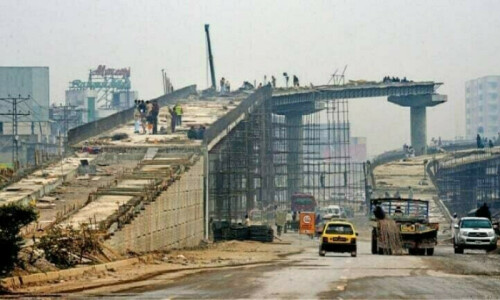 After an inordinate delay of more than 45 days, nearly two dozen sugar mills out of 29 in Sindh have started crushing sugar cane from November 15. Normally the sugar season should commence from October 1 and continue till end-March. But this year, too, like the previous years, cane crushing was delayed because of the conflicting positions taken by the millers and growers on sugar cane prices.
After an inordinate delay of more than 45 days, nearly two dozen sugar mills out of 29 in Sindh have started crushing sugar cane from November 15. Normally the sugar season should commence from October 1 and continue till end-March. But this year, too, like the previous years, cane crushing was delayed because of the conflicting positions taken by the millers and growers on sugar cane prices.
Millers are not ready to pay Rs67 for 40 kilogram of sugar cane to the growers. Growers want Rs70 for 40 kilograms. One of the millers contended that after paying government taxes, the ex-mill sale price of one kilogram sugar is even less than the buying cost of the sugar cane. Financial cost, utility charges and transportation further add to their losses. They fear huge losses and default on bank loans
In this conflict of titans--as both millers and growers represent powerful political and business interests-- the only victims are helpless consumers now paying as much as Rs35 — 45 for a kilogram of sugar. Sugar was sold at Rs23 in the year 2005 and within two years, the prices have increased by more than 100 per cent. Sugar mill workers too suffer because of the seasonal nature of their jobs.
The crushing season was delayed as millers took a position that carryover stocks are sufficient to last till November. But by first week of November, only one out of 29 mills in Sindh indicated to begin crushing.
The Sindh Cane Commisioner, Mr Baaz Junejo then issued notices to 20 mills under the relevant law. Cases were filed against nine mills in the court. Two mills reported temporary repair and maintenance shut down while a new mill at Ghotki is about to commence its operations sometimes next month. ‘’Some 27 mills will be in operation within a week to 10 days’’, the Cane Commissioner informed who expects a production of more than one million tons of sugar this season. Sindh’s requirement of sugar is about 0.7 million tons while the remaining quantity is sold out to Balochistan or NWFP. On occasions, excess sugar is exported too.
But millers complain of sugar flowing from NWFP and Punjab into Sindh. The sugar imported by Afghanistan is finding its way into NWFP and finally reaches Karachi-- the biggest buying centre of the country. The sugar imported from India is also trickling down in Sindh from Punjab. But there is no quantification of this inflow of sugar. The Cane Commissioner said that it was the federal government’s responsibility to assess the inflow of sugar from other countries into local market.
The millers are understood to have given their estimate of sugar inflow into Sindh through Pakistan Sugar Mills Association but are not ready to share this figure with the media. Analysts predict a sugar crisis as witnessed in the year 2005-06 when sugar was scarce and prices shot up. This year, the Trading Corporation of Pakistan (TCP) utilised its imported stock to maintain a steady supply during Ramzan and consumers were somewhat spared of high price rise. Nonetheless, sugar prices are still close to Rs40 a kilogramme.
The officials and growers say that delay in crushing by mill owners was intended to force growers to bring sugar cane prices down to Rs63-64 for 40 kilogram. An official who was involved in drawing up a price fixing mechanism through discussion with the millers and growers during September and October blamed the millers for being ‘’too obstinate’’.
Growers ridicule millers, who they say, are in habit of rejecting every price-fixing mechanism but subsequently in the season when many of these mills foresee growing demand for sugar in the market, these go for buying spree. Last year, the millers were not ready to accept Rs60 for 40 kilogram of sugarcane. But as they saw a rising demand for sugar in the market, the millers breached an agreement reached at the forum of their association and pushed up prices beyond Rs115 for 40 kilogram.
“They will pay more than Rs67 this season too’’, Syed Qamaruzzaman Shah, the President of Sindh Chamber of Commerce replied on telephone when asked if delayed cane crushing by the mills affected growers at all. Qamaruzzaman Shah said that delay has affected wheat sowing. Wheat production may be lower than projected for the next crop. The growers blame millers for delaying the cane crushing and thus forcing them to leave crop standing in the field.
Both the government and growers blame millers for concealing data and information of sugar stocks. In 2006, the Monopoly Control Authority and National Accountability Bureau moved swiftly to take action against 42 sugar mills of which 16 were from Sindh. The NAB submitted a list of those mills belonging to eight ministers of outgoing government and to Nawaz Sharif family that stocked sugar. The Monopoly Control Authority too imposed fines from Rs0.1 million to Rs10,000 on 32 mills which failed to comply with instructions of posting Authority with updated information and data on production and stocks.
All said and done, the crushing this season begins amidst conflicting reports. The millers expect losses in their business and hence the possibility of default on bank loans. Market analysts believe that with the carry over stocks about to finish and delay in cane crushing, prices of sugar will go up. The consumers are set to suffer.















































Dear visitor, the comments section is undergoing an overhaul and will return soon.